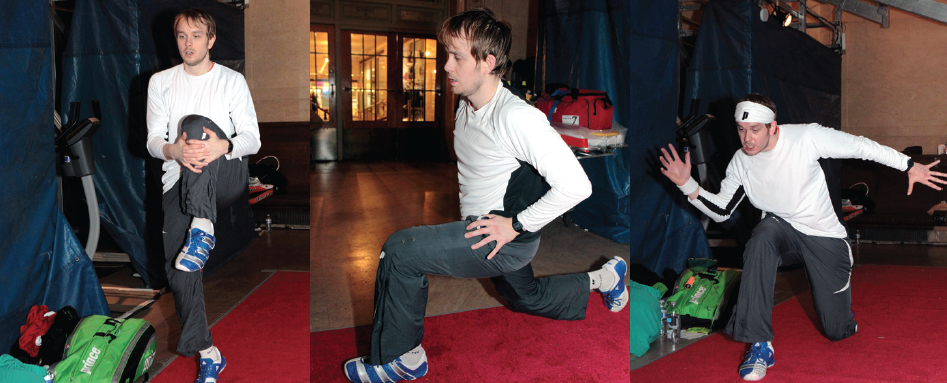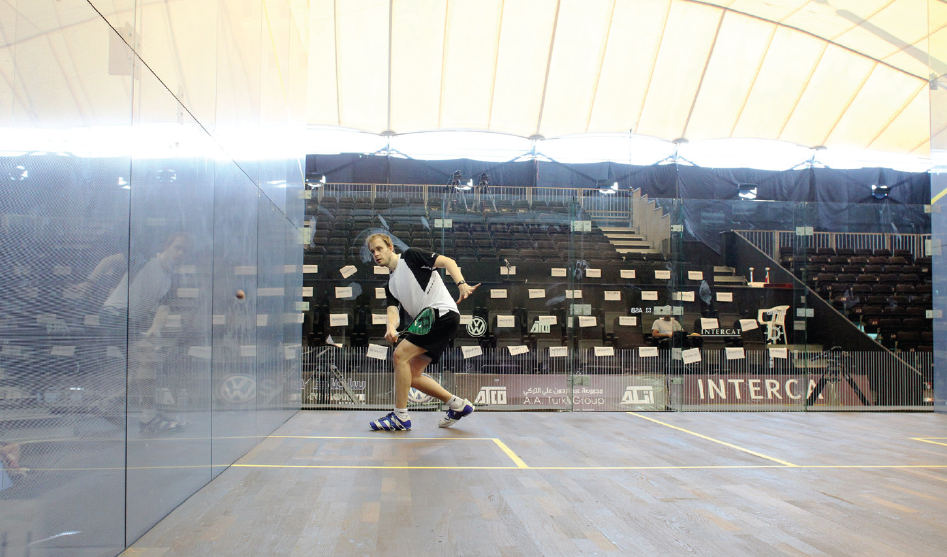
By Richard Millman, Owner—Westchester Squash
No matter what your level of play, there are certain steps you can take to improve your game.
These steps—the pillars of your game if you will—are sure-fire ways of moving forwards if you are clinical about your approach to them.
Here are the essential pillars that you should consider, if you really want to improve your game:
1) Understanding the game.
Let’s face it—it doesn’t matter how hard you work—if the basic assumptions you are depending on are flawed, you aren’t going to improve very much. So take the time to check out the basis of your understanding. What do you think the game is about? If you think the main reason for hitting a squash shot is to win the point, then you are in trouble. If you think the main purpose of hitting a squash shot is to put yourself in a good position, so that you are continually trying to stay ahead of the game, then you are on the right track. Either way, book a couple of lessons with a well-respected pro and treat yourself to a tune-up lesson or two. That way you will receive some direction and know what to do next. Of course if you are really serious you should be working with a coach and mentor continuously.
2) Preparation
This comes in many guises, but loosely we can break it down into the essential elements of ‘mind body and soul’ or put an- other way: ‘ mental, physical and emotional preparation.’
Of course booking your tune up lesson with a respected pro comes under the mental preparation header. Thereafter you need to work on your preparation methodically.
Some of you who are regular readers will remember my comment in an earlier article: ‘Preparation is the performance.’
Keep a note book
Whether you are taking a lesson, practicing on your own or with a partner, competing in a friendly or an official competition; keep notes after each session. Write down the five or six bullet points that you are either pleased with or want to improve on. Only write in positive terms—no self-criticism. There is a practical reason for this. If you describe your failures you will find that you only establish where you have failed, whereas if you describe what you want to do better, your mind will be stimulated to visualize that improvement. Forward momentum is essential in all aspects of Squash. Make this a habit. This is a key part of your emotional training.
Do at least a thousand shots of solo practice on each side per week.
You must make time for solo practice, especially in the run up to an important tournament or match. This is the way to find your touch and feel—imperative if you are going to play tight.
Play tournaments
The best way to get ready for a tournament is to play a tournament. Unless you are a complete beginner with technical difficulties that prohibit you from returning a serve or serving, you must enter as many tournaments as you can.
One tournament is worth any three lessons of anybody’s teaching in my opinion—provided you know how to play a tournament. If you are new to tournaments, don’t just play the official matches you are scheduled for. Hang out at the tournament, offer to referee, watch the better players (make notes about how and when they move, how and where they hit the ball, how they vary the pace, any unique skills or behaviors they display) although don’t watch too long immediately before your match, or you will be mentally “played out.” Try to arrange some friendly games with other players at the event (although don’t trouble the better players as they are really trying to focus on the latter stages).
If you have a target tournament, play two preparatory tournaments in the month before, then leave one week to rest before the big event.
Book a session with a well-respected sport specific physical trainer and a sports masseur
Get a check-up for your body. Find out where your weaknesses are and if you have tightness in muscles and tendons that you weren’t aware of. Then get a personal training and stretching plan and start working on your physical improvement.
3) Performance
Treat each performance as a step on an infinite journey—not as an end point. If you have prepared thoroughly you should feel nervous excitement and be looking forward to your performance.
Warm-up
Make sure your warm up is thorough. It is almost impossible to warm up too much—unless you play a full match immediately before your target match!
Remember your warm-up should have you at peak performance level before the first point of the match. Warm-up should again consist of the mind, body and soul elements. You should be thinking about your game plan, taking yourself through rigorous, sports specific movement routines, and using positive epithets and key phrases. Words that I find helpful are: ‘remember—good work brings its own rewards,’ or ‘play well and you will get the result you deserve,’ or simply ‘focus!’
Performance
When your performance begins you must banish thoughts of winning and losing from your mind. As the Nike marketing phrase has it: ‘Just do it’—don’t think about outcomes, Squash is a performance-based activity and all of your resources must be dedicated to the performance. The outcome will be determined by your performance. you don’t want your performance to be determined by the outcome!
Throughout the match, adopt a game plan that works for you and stick to it unless there is hard evidence that it is not appropriate or the opponent is coping with it too easily. Any adaptations you make have to be based on logic, not fear.
Having a coach with you when you are playing a tournament can be very useful— learning at the coal face so to speak—but ultimately you are responsible, so make sure any advice you follow is advice that you understand and agree with, so that you have the moral confidence to execute the plan.
Keep repeating your mantra—whatever works for you—and don’t hesitate. Win or lose, play your best to the very last point.
Leads and deficits
If you are a long way ahead or a long way behind, it is very tempting to start extrapolating the likely outcome. Don’t! If you are ahead tell yourself to continue the game plan, except execute it better than at any time previously in the match—after all, the opponent is likely to fight harder for survival and so you must fight even harder for victory.
If you are behind, hope that your opponent hasn’t read this article, fight harder than ever, and hope that they fold under the pressure. A Squash match will frequently turn on one debilitating rally—it isn’t about stacking up points, it’s about breaking the opponent’s mind body or soul. Sound familiar?
4)Review and redress
Probably the worst gauge of performance is whether you won or lost. Yes, it is a great feeling to win, and yes, it is lousy to lose. But as a measure of performance the accuracy of winning and losing is almost useless. So when a well-meaning parent asks a group of kids, “who’s going to win today?” They are succeeding in distracting the children from focusing on the task and setting up the whole group for disaster on a wild goose chase of emotional nonsense. There is nothing wrong with wanting to win. To do it, you must focus on your performance, not on the outcome.
Perform well and you will get the result you deserve. If you happen to be a beginner playing someone of vastly more experience, losing is not an indication of failure, just as for a very experienced player to beat a relative beginner is not an indication of success—though society contributes to the emotional ups and downs of the two players. Of course, winners must celebrate the win and losers must be disappointed in losing. That is the emotional residue of the performance. But then we need to talk about whether or not we were successful and look to our next performance.
More important and more accurate as measurement of success than win/loss outcomes is a review of performance based on previous performance factors. These factors can be numerous, but once again need to based on the mental, physical and emotional check list. Did you keep focused on your game plan throughout. How many unforced errors did you make? Were you consistently hitting the sidewall with your serve? Did your lungs give you more trouble than your legs? How was your change of direction? Did you allow your opponent to distract you? Were you volleying every ball you could? Did you recognize any weaknesses in your opponent?
Whatever you and your coach set out as goals for this match, were you successful in achieving those goals and to what degree?
Write it down in your notebook and then develop the next phase of your plan going forward.
Use the valuable data available from your last performance to enhance your approach to your next performance. Continual detailed assessment will help to make your improvement strategy successful. These are your ‘Steps to step-up your game.’ Hopefully this can become the stairway to your personal Squash Heaven!”


